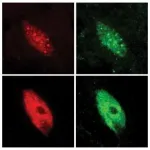Conservatives' sensitivity to pandemic threat suppressed by distrust of science, media
2021-06-30
(Press-News.org) Researchers studying the intersection of politics and psychology have long documented a link between threat sensitivity and social conservatism: People who are more socially conservative tend to react more strongly to threats. Conversely, those who are more socially liberal tend to be less sensitive to threats, viewing the world as a generally safe place and embracing change to explore new possibilities.
These findings have held across a variety of events, but during the pandemic, U.S. polls show that Democrats, who tend to be more liberal, have generally been more concerned about the COVID-19 threat than Republicans, who tend to be more conservative. A new UCLA study explores this reversal, probing the relationship between innate dispositions toward threats, the social environment and responses to the pandemic.
Led by UCLA graduate student Theodore Samore, anthropology professor Daniel Fessler and postdoctoral scholar Adam Sparks, along with cognitive scientist Colin Holbrook from UC Merced, the study found that Republicans' and independents' inclinations to embrace protective behaviors in proportion to their degree of conservatism were overruled by distrust in science and in liberal or moderate information sources. Republicans and independents also focused on the negative economic impacts of the lockdowns and the perceived infringement upon personal liberties. Together, these factors led socially conservative Republicans and independents to take fewer precautionary measures, such as mask-wearing, physical distancing and sanitizing.
"The distrust of science and public health officials, as well as distrust of moderate and liberal media sources, actually countermanded responses that reflected people's underlying personality traits," Fessler said. "For example, we can think about how behaviors among Republicans and independents may have been different if evangelical church pastors had promoted mask-wearing to protect the elderly and most vulnerable. Instead, conservative Republicans and independents were influenced by high-profile individuals who downplayed the severity of the virus and undermined reliable information sources."
Both major political parties span a range of social perspectives. Democrats were less influenced by messaging that undercut scientists and moderate journalists. Socially conservative Democrats were more willing to adopt precautionary measures than more liberal party members, demonstrating the connection between social conservatism and threat reactivity.
"There's been a broad tendency to see partisan responses to the pandemic as existing along a simple left-right axis, where more liberal Americans have exhibited greater precautions than more conservative ones," Samore said. "However, we find that more socially conservative Democrats were taking greater COVID-19 precautions than more liberal ones, suggesting that these political dynamics are in fact more complex than is commonly presumed."
As Holbrook explained, "The data show that conservatives who trusted scientific authorities and media reporting that advised precaution actually took greater COVID-19 safety measures than progressives did, and these patterns are not explained by factors such as differences in age or employment."
The research raises disturbing implications. "The findings suggest that Republicans would have been substantially more careful had their media environment encouraged them to do so, plausibly saving many thousands of lives and preventing scores of long-term health problems related to COVID infection," Holbrook said.
The investigators note that today's media environment is a key factor in how people understand and respond to major events.
"As we flatten the information highway, giving everyone a voice on social media, we undermine or lose the authority of professional journalists and scientists," Fessler said. "There is great potential for misinformation about science to be disseminated, and for people to actually act against their gut instincts or self-interest."
The investigators ran two studies, using identical methods, six weeks apart to ensure results would not reflect a specific time period's social and political landscape. For each study, 1,000 paid participants were recruited through an online crowdsourcing platform. Survey questions asked about political party affiliation; hot-button political issues, such as abortion, tax rates and military intervention abroad; and attitudes toward social change more broadly. Other questions assessed participants' views on science and attitudes toward a variety of media sources, individual journalists, and prominent politicians and scientists. Participants also reported the extent to which they followed various COVID-19 protocols, such as hand-washing, physical distancing and mask-wearing.
The good news, Fessler said, is that individual decisions aren't necessarily set in stone.
"As the success of the ongoing U.S. vaccination campaign demonstrates, when people of diverse political orientations are able to unite in the face of danger, everyone benefits," he said. "Understanding how individuals differ in their reactions to threats, and how this interacts with their political leanings and information consumption, may provide a vital link to understanding and addressing shared challenges in our increasingly interconnected world."
INFORMATION:
ELSE PRESS RELEASES FROM THIS DATE:
2021-06-30
URBANA, Ill. - Proteins have been quietly taking over our lives since the COVID-19 pandemic began. We've been living at the whim of the virus's so-called "spike" protein, which has mutated dozens of times to create increasingly deadly variants. But the truth is, we have always been ruled by proteins. At the cellular level, they're responsible for pretty much everything.
Proteins are so fundamental that DNA - the genetic material that makes each of us unique - is essentially just a long sequence of protein blueprints. That's true for animals, plants, ...
2021-06-30
In cases of breast cancer, bone metastasis - when cancer cells spread to new sites in the bone - causes the most breast cancer-related harm and is often incurable in advanced disease. A new study by University of Arizona Health Sciences researchers found that cancer cells become more aggressive when exposed to tissue stiffening and that these changes persist over time.
Tumor stiffening, which develops as diseased breast tissue becomes fibrotic, plays a major role in how breast cancer cells spread throughout the body. The paper, "Breast tumor stiffness instructs bone metastasis via maintenance of mechanical conditioning," published today in the journal Cell Reports, ...
2021-06-30
A pair of College of Business professors and their doctoral student at The University of Texas at Arlington are exploring how ransomware attacks sometimes pit organizations against the law enforcement agencies trying to protect them.
Kay-Yut Chen, Jingguo Wang and Yan Lang are authors of a new study in the journal Management Science titled "Coping with Digital Extortion: An Experimental Study on Benefit Appeals and Normative Appeals." Chen and Wang are professors of information systems and operations management at UTA. Lang is a doctoral student in the department.
A ransomware attack is like a cyber hijacking, with criminals infiltrating and seizing an organization's data or computer systems and ...
2021-06-30
In hospitals, we know that the nurses are the first to deal with patients in pain. For any ailment, including patients needing hemodialysis, the knowledge of pain management, the nurses have, allow them to provide optimal pain management.
This qualitative study aims to explore the experiences, perceptions, and beliefs of nurses serving in the hemodialysis unit in terms of pain management practices. The study helped identify the educational needs of the nurses to improve pain management in practice. A subjective sample of 16 nurses working in four out-patient hemodialysis units in Amman, Jordan, was hired for this research. Using semi-structured interviews, the data was collected.
The study found five themes and fifteen subcategories ...
2021-06-30
Oak Brook, IL - The July edition of SLAS Discovery is a Special Edition featuring the cover article, "Development of a High-Throughput Screening Assay to Identify Inhibitors of the SARS-CoV-2 Guanine-N7-Methyltransferase Using RapidFire Mass Spectrometry" by Lesley-Anne Pearson, Charlotte J. Green, Ph.D., De Lin, Ph.D., Alain-Pierre Petit, Ph.D., David W. Gray, Ph.D., Victoria H. Cowling, Ph.D., and Euan A. F. Fordyce, Ph.D., (Drug Discovery Unit, School of Life Sciences, University of Dundee, Dundee, UK).
In January 2021, a survey of immunologists, infectious-disease researchers and virologists found that 90% of respondents believe SARS-CoV-2 will become endemic, continuing to circulate in pockets of the global population for years to come. Even as vaccines are ...
2021-06-30
Boulder, Colo., USA: GSA's dynamic online journal, Geosphere, posts articles online regularly. Locations and topics studied this month include the central Appalachian Mountains; fossil pollen in Colombia; the precision and accuracy of model analyses; the Bone Spring Formation, Permian Basin, west Texas; and the geochronology of modern river sediment in south-central Alaska. You can find these articles at https://geosphere.geoscienceworld.org/content/early/recent .
Spatially variable syn- and post-Alleghanian exhumation of the central Appalachian Mountains from zircon (U-Th)/He thermochronology
Luke C. Basler; Jaclyn S. Baughman; Michelle L. Fame; Peter J. Haproff
Abstract: To assess spatial and temporal patterns of Phanerozoic orogenic burial and subsequent ...
2021-06-30
Key Takeaways:
Research reveals consumer demand declines when product packaging and marketing materials removed the claim, "Made in USA" and increase when the claim was featured.
The impact on sales is insufficient to convince some companies to manufacture more products in the United States but enough to incentivize companies to make deceptive "Made in USA" claims.
CATONSVILLE, MD, June 30, 2021 - Pick up any product in just about any store and you're likely to find information that indicates the country of origin of the product. The U.S. Federal Trade Commission (FTC) requires this for any imported product, but not for products made in the United States. When you see the words "Made in USA" on a product, it's purely for marketing purposes. So, does it work?
According to a ...
2021-06-30
LA JOLLA--(June 30, 2021) Scientists--and gardeners--have long known that plants grow taller and flower sooner when they are shaded by close-growing neighbors. Now, for the first time, researchers at the Salk Institute have shown the detailed inner workings of this process.
The study, published June 17, 2021, in Nature Genetics, offers a new understanding of how gene activity directs plant growth, and how quickly plants respond to their environment--with shifting light conditions triggering molecular changes in as little as five minutes. The findings provide insights ...
2021-06-30
When it comes to defense, the body relies on attack thanks to the lymphatic and immune systems. The immune system is like the body's own personal police force as it hunts down and eliminates pathogenic villains.
"The body's immune system is very good at identifying cells that are acting strangely. These include cells that could develop into tumors or cancer in the future," says Federica Eduati from the department of Biomedical Engineering at TU/e. "Once detected, the immune system strikes and kills the cells."
Stopping the attack
But it's not always so straightforward as tumor cells can develop ways to hide themselves from the immune system.
"Unfortunately, tumor cells can block the ...
2021-06-30
Growing resistance to our go-to antibiotics is one of the biggest threats the world faces. As common bacteria like strep and salmonella become resistant to medications, what used to be easily treatable infections can now pose difficult medical challenges.
New research from the University of Georgia shows that there may be more antimicrobial-resistant salmonella in our food animals than scientists previously thought.
Using technology she developed, UGA researcher Nikki Shariat and Amy Siceloff, a first-year doctoral student in UGA's Department of Microbiology, found that traditional culturing methods used to test livestock for problematic bacteria often miss drug-resistant ...
LAST 30 PRESS RELEASES:
[Press-News.org] Conservatives' sensitivity to pandemic threat suppressed by distrust of science, media



